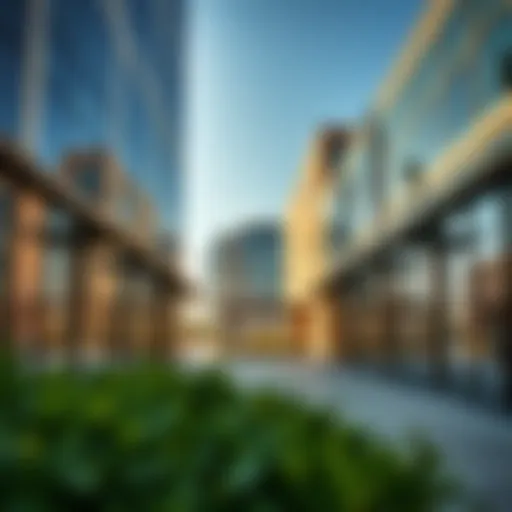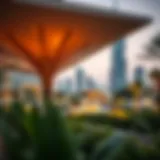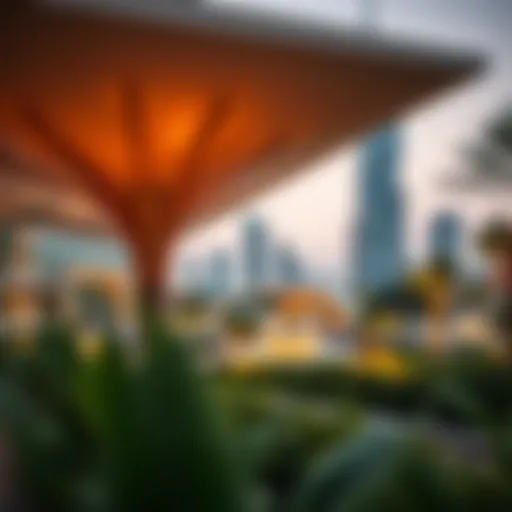Dynamics of the شعب Market in Dubai


Intro
Dubai, a bustling metropolis in the desert, is known for its striking skyline and luxurious lifestyle. The real estate sector is integral to this vibrant economy, and within it, the شعب market stands out as a unique segment. Often characterized by its distinct cultural influences and economic dynamics, the شعب market offers an array of investment opportunities that attract both locals and expatriates.
In this article, we’ll peel back the layers of the شعب market, examining its trends, investment strategies, and the socio-economic factors that shape it. Whether you're an astute investor or a curious enthusiast, the insights gathered here aim to arm you with the necessary knowledge to navigate the complexities of property investment in Dubai.
As we proceed, you’ll discover key neighborhoods ripe for investment, promising developments on the horizon, and a detailed analysis of market behavior. By exploring these elements, we hope to highlight the significance of the شعب market in the broader framework of Dubai's real estate landscape.
Prelude to the شعب Market
The شعب market in Dubai signifies more than just a collection of properties; it's a vibrant tapestry woven from the cultural and economic threads that define the city. For potential investors and property enthusiasts, understanding how this market ticks can be immensely beneficial. With each sector revealing its own dynamics, one can uncover hidden gems or avoid pitfalls��—this is where we lay the groundwork for deeper exploration.
Defining the شعب Market
The شعب market refers to a unique segment of real estate within Dubai characterized by its diverse property types, ranging from luxurious villas to modern apartments. Unlike conventional markets, the شعب is significantly influenced by cultural nuances and social sentiment. Properties here aren’t just transactions; they're often seen as a way of life.
Key characteristics of the شعب market include:
- Diversity of Offerings: Units cater to various preferences and budget ranges, making it accessible to a wider audience.
- Community Focus: Developments often foster a sense of belonging, featuring communal spaces and amenities that encourage social interaction.
- Investment Appeal: The شعب has demonstrated substantial ROI potential over the years, making it a point of interest for investors looking to capitalize on Dubai’s real estate boom.
By solidifying an understanding of what comprises the شعب market, we can examine its current trends and how they reflect broader shifts in the economic landscape.
Current Trends in the شعب Market
In the ever-changing economic climate of Dubai, the شعب market is currently seeing several noteworthy trends:
- Increased Demand for Affordable Housing: As more individuals flock to Dubai for work opportunities, the demand for affordable living options is rising. Developers are responding by introducing more reasonably priced units, making it easier for working professionals and families to settle down.
- Sustainability and Green Living: With an increased focus on eco-friendly developments, many new projects prioritize sustainability. Green buildings and energy-efficient designs are becoming the norm, appealing to eco-conscious investors and residents alike.
- Technological Integration: Smart home technologies are finding their way into many شعب properties, enhancing security and convenience. Potential buyers are increasingly looking for homes equipped with these modern amenities, driving demand in that direction.
As we navigate the complexities of this market, recognizing these trends can provide investors with critical insight, ensuring they are well-prepared to make informed decisions.
"Understanding the شعب market is fundamental for anyone looking to thrive in Dubai’s real estate landscape. The surrounding culture and current trends can significantly impact investment strategies and opportunities."
With these definitions and trends established, we can now delve deeper into the historical context that has shaped the شعب market, exploring its evolution and the factors that have contributed to its current state.
Historical Context of the شعب
Understanding the historical context of the شعب market in Dubai provides valuable insight into its dynamics and ongoing development. Historically, the شعب market is rooted in the rich cultural tapestry of the region, showcasing how traditional values meld with modern aspirations. Recognizing this backdrop is crucial for investors looking to navigate the complexities of the market and make informed decisions.
Evolution of the شعب Market
The شعب market has undergone significant transformations over the decades. Initially, the property landscape was mostly characterized by an informal trading culture, where local buyers and sellers engaged in transactions largely based on trust. As Dubai emerged as a global city, the شعب market began to formalize its structures. The introduction of the Dubai Land Department in the early 2000s marked a turning point, establishing necessary regulations and fostering transparency. Gradually, the market shifted from a somewhat loose framework to a more regulated entity, enhancing credibility and attracting international investors.
Additionally, the evolution of the شعب market has echoed the broader economic swings experienced in the region. From the boom during the real estate bubble to the subsequent corrections in the 2008 financial crisis, each phase has shaped investor attitudes and the types of properties in demand. The incorporation of modern architecture alongside traditional designs reflects a blend of old-world charm and contemporary innovation, inviting diverse investors interested in various property types.
Impact of Economic Changes
Economic changes have undeniably influenced the شعب market in profound ways. For one, fluctuating oil prices have historically dictated economic vitality in the UAE. Periods of high oil revenues have led to soaring property prices and construction booms, while downturns often result in market corrections. Investors must remain vigilant and attuned to these economic signals.
Moreover, global economic trends, such as post-pandemic recovery, have shifted buyer preferences and behavior. The increase in remote work has spurred interest in residential properties with more space and amenities, prompting developers to adapt their offerings.
"Whether the economy is on the rise or taking a dip, savvy investors know that observation and patience are key to navigating the شعب market effectively."
In summary, the historical context of the شعب market is not merely a backdrop but a vibrant narrative that shapes its current state. Investors must be cognizant of past patterns and economic indicators, as they present clues to potential opportunities and challenges in this dynamic market.


Key Characteristics of the شعب Market
The شعب market in Dubai is a vibrant tapestry woven from diverse threads of property types, cultural nuances, and social context. Understanding these characteristics is crucial for any investor or industry professional looking to tap into this unique segment. The شعب market showcases not only the physical properties available but also the cultural and social dynamics that heavily influence purchasing behaviors. Recognizing these elements can provide a strategic advantage.
Diverse Property Types and Options
The شعب market is characterized by a wide array of property types that cater to various demographics and preferences. From luxury villas in serene neighborhoods to chic studios in bustling urban areas, the options are plentiful. This diversity is one of the main attractions for investors. It allows for tailored investments that align with personal strategies and market demand.
- Residential Properties: The شعب market offers everything from high-end apartments in iconic skyscrapers to affordable housing options for families. The blend of luxury and budget-friendly choices attracts potential buyers and renters from different backgrounds.
- Commercial Spaces: With Dubai being a trade hub, commercial properties are plentiful—think office spaces, retail locations, and mixed-use developments. Investors focusing on commercial properties should analyze the location's accessibility and target market to maximize returns.
- Mixed-Use Developments: These are increasingly gaining traction, combining residential, retail, and community spaces. They cater to those who seek a convenient, all-in-one lifestyle.
Understanding the types of properties available helps investors to make informed decisions based on market trends and personal risk tolerance.
Cultural and Social Influences
Cultural dynamics play a significant role in the شعب market. While Dubai is a melting pot of cultures, the local customs and traditions profoundly influence real estate transactions. For instance, the importance of family in Emirati culture often leads to a preference for larger family homes in specific neighborhoods. Recognizing these social and cultural inclinations is key for successful investment.
- Local Buying Habits: Understanding what drives property purchases among different demographics can help investors target their marketing effectively. For example, expatriates might lean towards modern, furnished apartments that are ready to move in, while local families may prioritize space and community amenities.
- Lifestyle Preferences: The demand for amenities like parks, schools, and shopping areas can significantly affect property values. Investors should consider community features that resonate with the lifestyle preferences of potential buyers or renters.
Investment Opportunities
The شعب market in Dubai has carved a niche for itself, reflecting a unique fusion of local culture and international appeal. Understanding investment opportunities in this segment is crucial for anyone interested in diving into the region's real estate landscape. This aspect not only uncovers potential gains but also informs investors of essential factors like property types, market demographics, and local regulations.
Investing wisely in the شعب market can yield significant advantages. Firstly, it offers diverse property types, from traditional family homes to contemporary apartment complexes. Each type caters to a distinct demographic, enhancing the chances of investment success. Secondly, the market's inherent volatility can be both a challenge and an opportunity. Investors who can interpret market signals effectively often find lucrative deals, turning the tide in their favor.
Inherent in this discussion are the considerations regarding location and property demand. Urban areas, especially those close to amenities and major thoroughfares, tend to have high demand. Also, keeping an eye on upcoming developments can be a game-changer. With the government's commitment to infrastructure growth, certain areas may see accelerated appreciation in property values.
Investment in the شعب market is not merely about monetary returns; it's about understanding the cultural fabric and creating value within it.
Moreover, when discussing investment, the importance of leveraging local expertise cannot be overstated. Engaging with property managers or real estate agents who know the ins and outs of the شعب market can provide insights that are not readily apparent to outsiders.
Identifying Promising Areas
Selecting the right area for investment is pivotal in the شعب market. Areas such as Al Quoz and Jumeirah Village Circle are gaining traction among investors. They balance accessibility and potential growth, appealing to both locals and expats. Investors should conduct thorough research on these neighborhoods by evaluating factors like:
- Economic development: Check for government projects or private investments.
- Accessibility: Measure the proximity to transport links and key facilities like schools and hospitals.
- Market activity: Track sales trends and rental yields in specific locales.
Successful investments often hinge on recognizing burgeoning neighborhoods. Participation in community events or local forums can also provide real-time insights into market dynamics. The rapport built through genuine engagement often reveals opportunities that raw data might not disclose.
Potential Returns on Investment
The شعب market offers various avenues for returns, dependent largely on the investor’s strategy. Long-term holding often yields steady appreciation, especially in high-demand areas. Alternatively, short-term flipping can offer rapid gains if timed with market peaks. Potential returns may be illustrated by:
- Rental income: With a consistent influx of expatriates, renting properties often yields reliable income. Investors should look for properties with high rental yields.
- Capital appreciation: Properties in up-and-coming areas can see significant value increases over time, especially if investment in infrastructure continues to grow.
- Tax benefits: Depending on one’s status, there may be tax incentives that enhance net returns.
While the potential for lucrative returns exists, investors should remain cautious of market fluctuations. Conducting thorough due diligence, staying informed about legislative changes, and aligning with reliable professionals can safeguard investments, ensuring that returns are not just attainable but sustainable.
Challenges in the شعب Market
Navigating the شعب market in Dubai is not for the faint of heart. Like a roller coaster, it’s filled with ups, downs, and unexpected twists. Each challenge presents unique situations that prospective investors and stakeholders have to face. Understanding these hurdles is essential, as they can make or break one’s investment journey. It’s here that knowledge meets opportunity; being aware of these challenges allows investors to better prepare for their decisions.
Regulatory Hurdles and Compliance
The legal landscape surrounding the شعب market is marked by regulations that can be quite complex. Property laws in Dubai aren’t just a few papers scattered around; they entail a web of rules, regulations, and administrative steps that can appear daunting to both local and foreign investors. Every new law can feel like trying to read a novel in a foreign language. It’s vital to grasp the requisite compliance measures when investing in property, particularly concerning the Freehold and Leasehold areas.
In response to developments in the economy, regulations often change. Investors must constantly stay updated on these amendments to ensure compliance. There are several specific aspects to pay close attention to:


- Ownership Rights: Investors need to be aware of what they can and cannot own in terms of property types. For example, expatriates can usually purchase freehold properties in designated areas, but this needs verification.
- Transactional Processes: A myriad of paperwork is involved in property transactions. Ensuring each document is ratified and recognized is paramount.
- Fee Structures: There are fees tied to registrations, transactions, and other legal hoops that need compliance.
Motivating factors for understanding these challenges become clear—the last thing anyone wants is to throw money down the drain due to legal oversights. As the saying goes, "an ounce of prevention is worth a pound of cure." Knowing regulatory hurdles can save investors from unforeseen pitfalls.
Market Volatility and Risk Factors
Investing in the شعب market entails a ride on a wave of volatility—where one moment prices skyrocket, and the next they plummet. Fluctuations within the regional and global economy, changes in investor sentiment, and shifts in local supply and demand dynamics can rapidly alter the landscape.
Several risk factors are often highlighted, and potential investors should take heed:
- Economic Uncertainty: As Dubai is interconnected with global trade, downturns in international markets can adversely affect property values.
- Supply and Demand Disparities: Overbuilding in certain areas can lead to a market flooded with properties, resulting in lower prices. Conversely, a sudden influx of investors can escalate prices dramatically.
- Policy Changes: Government initiatives or taxation changes can impact property ownership attractiveness. Changes to visa regulations, for example, can directly affect investor interest.
Engaging with local property experts or financial analysts can help decant some of this volatility. A knowledgeable perspective often provides insights that can lead to profitable decisions amidst turmoil.
Investing in real estate in Dubai's شعب market is like betting on a horse race. Knowing the odds can make all the difference between winning and losing it all.
As the شعب market evolves, maintaining vigilance regarding these challenges ensures that investors remain one step ahead. Understanding the landscape, preparation, and seasoned advice can be invaluable in recognizing that today’s challenges might just be tomorrow’s opportunities.
Legal Framework Governing the شعب Market
Understanding the legal framework in which the شعب market operates is essential for anyone looking to invest in Dubai’s real estate landscape. This framework encompasses specific laws, regulations, and guidelines that dictate how properties are bought, sold, and managed. Misunderstanding these laws can lead to financial pitfalls and legal troubles, underscoring the importance of a solid grasp of this area.
Understanding Property Laws
In Dubai, property laws are designed to create a transparent and equitable real estate market while protecting the rights of all stakeholders. One significant legislation is the Real Estate Law (No. 7 of 2006), which established the Dubai Land Department as the primary governing body. This law provides a clear framework for property registration, leasing, and transfers.
Key Elements of Property Laws in Dubai:
- Ownership Types: Property can be freehold, leasehold, or usufruct. Freehold ownership grants complete and permanent ownership, while leasehold typically covers a longer-term agreement, often for 99 years.
- Regulations for Foreign Ownership: Foreigners are permitted to buy property in designated areas, but certain restrictions apply. Understanding these zones is crucial.
- Financing and Mortgages: There are specific rules regarding financing arrangements in Dubai. It is essential to know whether the property qualifies for mortgage options available to both local and foreign buyers.
These elements shape the landscape for property transactions and influence investor confidence. Investors must be particularly aware of the processes involved in registering their properties to ensure compliance with the law.
Implications for Foreign Investors
For foreign investors, navigating the شعب market can be a double-edged sword. On one hand, the potential for high returns is alluring; on the other, the complexities of local laws can be daunting. The legal framework provides both opportunities and challenges.
Considerations for Foreign Investors:
- Limited Ownership Rights: While foreigners can own property in designated areas, restrictions remain, and understanding these limitations can save considerable hassle.
- Currency Fluctuations and Payment: Transactions typically occur in AED, and fluctuations in currency can impact the overall investment return. Legal agreements should account for exchange rate risks.
- Legal Representation and Agency: Engaging with local real estate agencies and legal advisors is crucial. These professionals offer insights into compliance and help navigate the local market’s intricacies.
Future Outlook
The future outlook of the شعب market in Dubai is a topic of high relevance, considering the rapid changes and potential that lie ahead. Understanding this outlook is crucial for investors, property managers, and agents who want to navigate the complex landscape of real estate in Dubai effectively. With a focus on projected trends and implications of policy shifts, stakeholders can make well-informed decisions that leverage emerging opportunities and mitigate risks.
Projected Market Trends
In analyzing the شعب market's future trends, a few significant indicators emerge. Firstly, the demand for residential properties is projected to increase, driven by population growth and the influx of expatriates. The World Bank recently projected that Dubai’s population will continue to grow steadily, which may fuel the demand in the شعب market as families seek homes that align with their cultural backgrounds.
Another trend is the rise of sustainable living developments. Investors increasingly prefer environmentally friendly homes and commercial spaces. Developers in Dubai are responding to this trend by integrating green technologies and sustainable practices into their projects. This emphasis on sustainability is expected to shape investment strategies in the coming years:
- Increased demand for eco-friendly materials
- Legislation promoting energy-efficient buildings
- Emergence of green community projects
Moreover, the growing popularity of technology-driven real estate solutions is altering the way transactions occur. Virtual tours and online listings have become standard, and as the demographic of buyers shifts towards tech-savvy millennials, it’s reasonable to anticipate an expansion in this area. Virtual reality and smart home technologies could redefine what buyers yearn for in properties, emphasizing connectivity and convenience.


"The شعب market stands at a pivotal moment, where cultural heritage meets the demands of modern living, creating unique opportunities for savvy investors."
Potential Policy Changes and Their Impact
The landscape of the شعب market will also be shaped significantly by potential policy changes that may arise from government initiatives. The UAE government is known for its forward-thinking approach, often adopting policies to attract foreign investment. As the market evolves, one can expect:
- New regulations promoting foreign ownership of properties
- Potential tax reforms affecting property investments
- Incentives for developers focusing on affordable housing
For foreign investors, these policy changes could have profound implications. For instance, the introduction of more lenient regulations on property ownership can enhance market appeal. This could lead to increased foreign direct investment in Dubai's شعب market, which may stimulate growth and innovation.
Conversely, tightening regulations about property management and operational compliance may pose challenges, necessitating that both investors and property managers stay informed and agile.
For agents and investors anticipating trends, staying attuned to government announcements and shifts in regulations will be integral. A proactive rather than reactive stance will allow stakeholders to position themselves favorably in the face of new developments.
Case Studies of Successful Investments
In the شعب market of Dubai, successful investment stories play a pivotal role in illustrating the potential gains and methodologies for both seasoned and novice investors. Case studies allow us to dive deep into real-world examples, showcasing not only the ROI but also revealing the strategic decisions that led to success. Understanding these cases can shed light on the complexities of market behavior, investment choices, and the socio-economic factors that influence outcomes.
Highlighting Noteworthy Properties
Examining specific properties that have yielded significant returns gives valuable insights to investors. For instance, the Dubai Marina stands out as an area where numerous investors have seen their portfolios flourish. Properties like the Marina Gate and The Address Dubai Marina have consistently attracted high occupancy rates, resulting in impressive rental yields. Investors like Sarah Ali, who purchased a two-bedroom apartment in Marina Gate in 2018, noted that her property value soared by over 30% within three years due to increasing demand for waterfront properties. This example underscores the importance of location, quality development, and amenities in ensuring sustained value appreciation.
Notable Insights:
- High Demand: The allure of waterfront properties draws both locals and expatriates, leading to increased demand.
- Quality Developments: Properties with modern amenities and lifestyle features tend to command higher prices.
- Long-Term Vision: Successfully navigating this market often requires a commitment to long-term investment, rather than seeking quick profits.
Analysis of Investor Profiles
Successful investments in the شعب market can greatly vary depending on investor profiles. For instance, consider the contrasting strategies between local investors and expatriates. Local investors may have a more profound grasp on the pulse of the market, often engaging in developments that reflect cultural significance. They might prefer traditional neighborhoods like Al Fahidi, where the sense of community and cultural heritage adds value.
On the other hand, expatriate investors often focus on luxury developments or high-demand areas like Downtown Dubai. They may seek properties in iconic towers such as Burj Khalifa or The Dubai Mall Residences, viewing them as both a lifestyle choice and an attractive investment opportunity.
Different Investor Strategies:
- Local Investors: Often invest in properties with heritage significance, benefiting from community-driven developments.
- Expatriate Investors: Favor high-end luxury apartments that promise good returns, influenced by global market trends.
- Institutional Investors: Large investment firms typically look for large-scale developments or portfolios that offer stability and long-term growth.
Understanding these profiles helps prospective investors tailor their strategies to their own goals and market dynamics, enhancing their chance of capitalizing on their investments.
“The key to success in the شعب market is not just timing the market but understanding it deeply.”
Closure
Summarizing Key Insights
The شعب market in Dubai presents a unique tapestry of opportunities and challenges. Throughout this article, we've dissected various elements that shape this market. From its historical context to current trends, every nuance plays a crucial role in attracting investors and influencing market dynamics.
Key insights include the understanding that Dubai's شعب market is not static; it evolves with the local and global economic climate. The blend of cultural influences and diverse property options offers a rich canvas for potential growth. Notably, areas identified as promising for investment suggest an upward trajectory, backed by solid demand and strategic developments.
Moreover, comprehension of the regulatory environment is vital. Investors who familiarize themselves with local laws and policy changes can navigate potential pitfalls effectively. The complexities surrounding property ownership laws for foreigners and the associated financial implications warrant deliberate consideration, ensuring that decisions are informed and strategically sound.
Encouragement for Informed Decision-Making
Informed decision-making is the bedrock of successful investment in the شعب market. Potential investors need to stay updated with market fluctuations, emerging trends, and economic indicators that could impact their investments. Particularly, engaging with local experts, attending market seminars, and participating in relevant real estate forums can broaden perspectives and reveal new opportunities.
Opportunities may arise unexpectedly—be it a developing neighborhood or a legal amendment favoring foreign investment. Keeping a keen eye on these facets can lead investors to untapped potential that others might overlook.
Furthermore, networking with other investors and real estate professionals can provide insights that distill market complexities into actionable strategies. The path to successful investment is rarely a straight line, but with dedication to research and strategy, it can lead to rewarding outcomes.
Investing wisely in the شعب market can yield returns that not only reflect financial gain but also contribute to the vibrant fabric of Dubai's evolving real estate landscape.
For more detailed insights into the شعب market, consider reviewing sources such as Wikipedia for foundational knowledge, Britannica for historical context, or forums like Reddit where current conversations about market trends are held. Following relevant local regulations and consulting local real estate portals can also be instrumental in making well-informed decisions.



